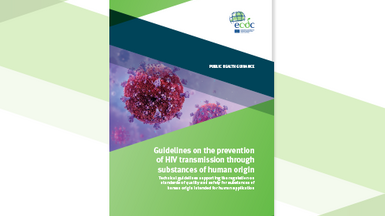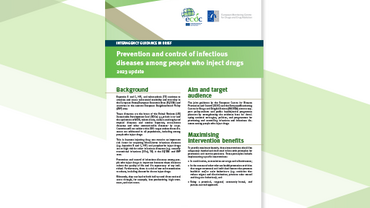Public health guidance on HIV and STI prevention among men who have sex with men
In all countries of the European Union and European Economic Area, men who have sex with men are disproportionately affected by HIV and other sexually transmitted infections including gonorrhoea, syphilis, chlamydia and hepatitis B and C. There is evidence that services to prevent, diagnose and treat infections are not being delivered at the appropriate scale to impact on transmission patterns.
This guidance, based on a systematic review of the literature and expert opinion, suggests that there is good evidence to ensure that some key components are considered for inclusion in national and sub-national public health programmes in countries in Europe.
Executive Summary
Many European countries have had specific prevention programmes for men who have sex with men (MSM) since the early years of the HIV epidemic. But sex between men is still the predominant mode of HIV transmission across the EU/EEA. In its new guidance HIV and STI prevention among men who have sex with men, ECDC identifies seven key services to reduce and prevent HIV and other sexually transmitted infections (STI) among MSM.
The guidance suggests scientifically proven interventions that range from vaccination, better access to testing and condoms to timely treatment and targeted health promotion. For maximum effect, these are best applied in combination.
“Implementation and coverage of prevention services for men who have sex with men rarely meet policy goals across Europe. The ECDC guidance specifically addresses the needs for this group and summarises those interventions that have proven to work”, says ECDC Acting Director Andrea Ammon. MSM are the only key population that has not seen a decline in new HIV diagnoses during the last decade with an actual increase by 33% compared to 2004. In addition, the majority (58%) of all new syphilis cases in the EU/EEA in 2013 were reported among MSM.
Vytenis Andriukaitis, European Commissioner for Health and Food Safety said: "Men who have sex with men are the main risk group in the EU's policy framework addressing HIV/AIDS. With new infections still increasing in this group, I very much welcome the guidance published by ECDC today. Identifying means of prevention is essential, along with reducing the stigma of HIV in general and amongst MSM in particular. This scientifically proven guidance complements actions undertaken by the Union through the Health Programme, and I hope that Member States make good use of this evidence to halt the spread of HIV/AIDS.”
What drives the HIV epidemic among MSM Which interventions work
The HIV epidemic among MSM is influenced by various factors, practices and behaviours that can increase the risk of HIV and other STI. “No single intervention outlined in our guidance will significantly reduce HIV or STI transmission on its own of course. Needs and preferences vary across and within country settings, by individual and over time. To improve the sexual health among men who have sex with men in Europe, we need to target our efforts and tailor them to the national or local situation. Ideally, with the involvement of those we are targeting”, says Ammon.
In the guidance HIV and STI prevention among men who have sex with men, ECDC explores good public health practices that can effectively prevent infections among MSM and also includes reference to the needs of MSM who are living with HIV. Common blood-borne viruses in this group include HIV and hepatitis B.
Prevention services for MSM should be targeted following the analysis of relevant and reliable epidemiological data. As many countries in Europe experience constrained public health budgets, it is more important than ever to implement targeted and evidence-based measures that address the groups most at-risk.
The seven suggested interventions comprise:
- Vaccinations: Promote and deliver vaccination to protect against hepatitis A and B. Consider vaccination for HPV.
- Condoms: Provide easily accessible condoms.
- HIV and STI testing: Provide voluntary and confidential HIV and STI counselling and testing.
- Treatment: Timely provision of treatment for HIV, viral hepatitis and STI should be ensured.
- Health promotion: Provide accurate and accessible information that enables men to understand and assess sexual health-related risks and prevention efficacy.
- MSM-competent health services: Offer a comprehensive sexual health programme.
- Targeted care for MSM living with HIV: Provide antiretroviral treatment for HIV and vaccination; regular STI screening.
Download








